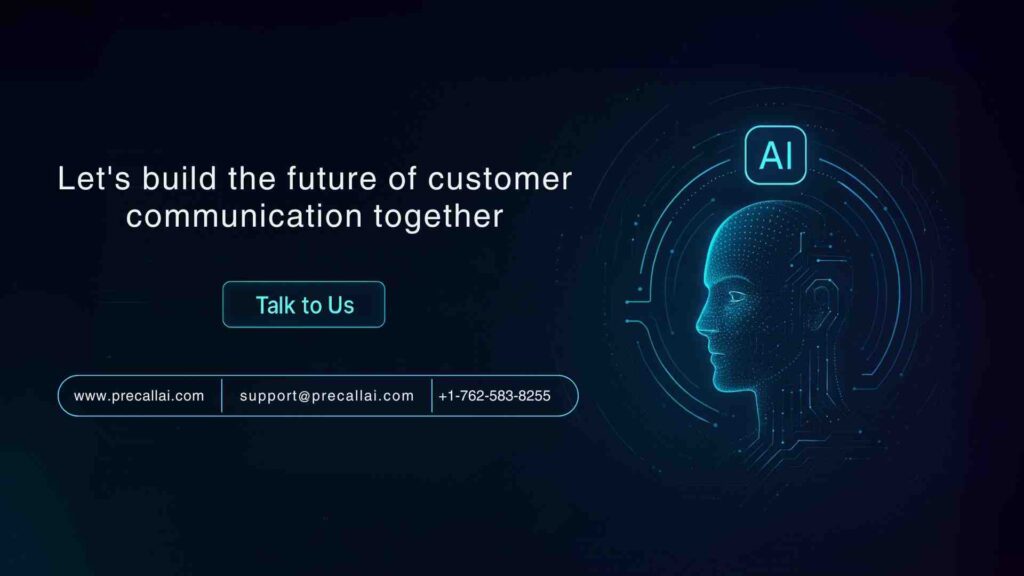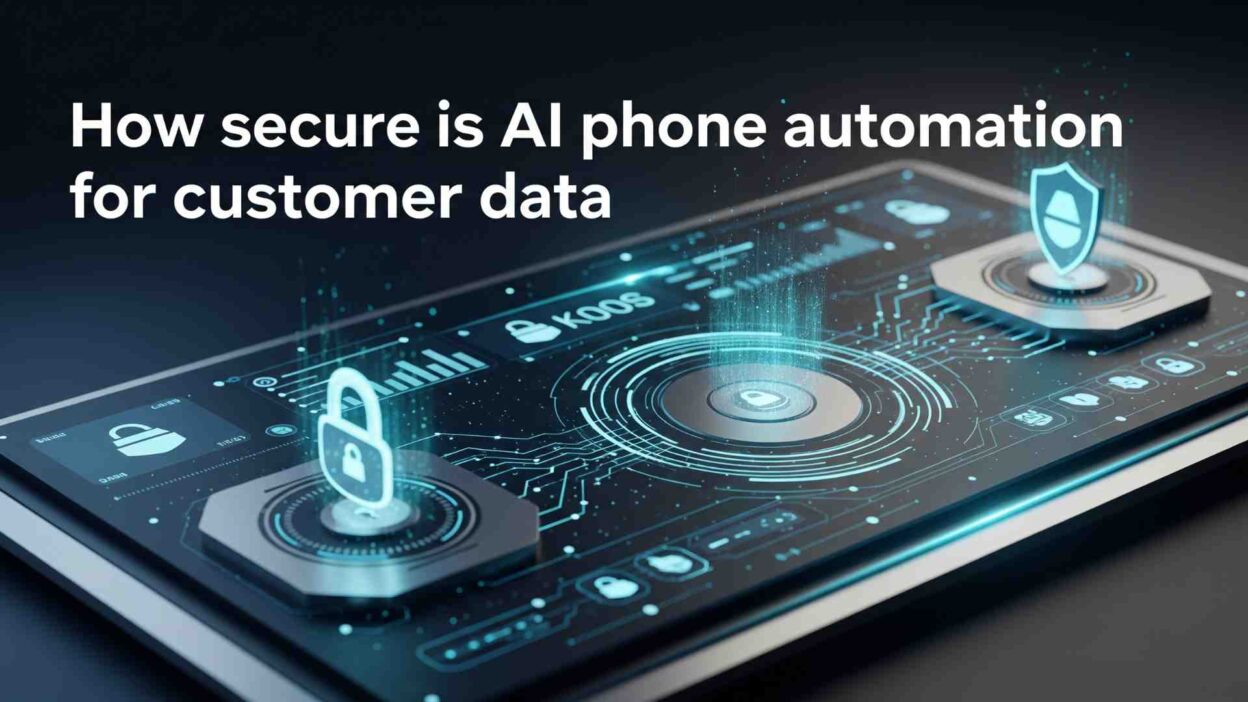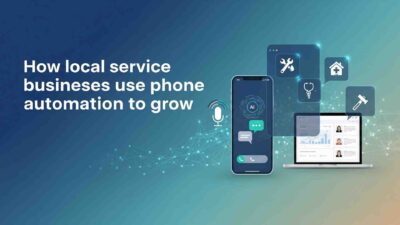TL;DR Phone automation data security remains the biggest concern for 78% of businesses considering AI calling solutions. Customer information theft costs companies an average of $4.88 million per data breach in 2024. Traditional phone systems lack modern security protocols that protect sensitive customer conversations and personal data.
Table of Contents
AI calling privacy concerns grow as more businesses adopt automated phone solutions for customer outreach. Companies worry about voice recordings, payment information, and personal details getting compromised during automated calls. Phone automation encryption becomes critical when handling thousands of customer interactions daily.
This comprehensive guide reveals exactly how secure modern AI phone automation systems protect customer data. You’ll discover industry-standard security measures, compliance requirements, and best practices that safeguard sensitive information. Learn which security features matter most and how to evaluate phone automation platforms for maximum data protection.
The Customer Data Security Challenge in Phone Automation
Growing Security Threats in Business Communications
Data breaches in telecommunications increased by 32% in 2024 according to cybersecurity reports. Phone systems handle massive amounts of sensitive customer information including payment details, social security numbers, and private conversations. Traditional phone networks often lack end-to-end encryption leaving customer data vulnerable.
Small businesses lose an average of $2.98 million per data breach while enterprise companies face losses exceeding $5.4 million. Phone automation systems process thousands of customer interactions daily, creating multiple entry points for potential security threats. Cybercriminals target voice data because it contains rich personal information and payment details.
Real Business Impact of Insecure Phone Systems
Healthcare practices using unsecured phone systems face HIPAA violation fines averaging $3.2 million per incident. Real estate agencies lose client trust when personal financial information gets compromised during property inquiry calls. E-commerce businesses see 40% customer churn rates after experiencing phone-related data breaches.
Service companies report losing major contracts when clients discover their phone systems lack proper encryption. Financial institutions face regulatory penalties averaging $8.7 million when customer financial data gets exposed through insecure calling platforms. Legal firms risk disbarment when client confidentiality gets breached through unprotected phone communications.
Cost of Inadequate Phone Automation Security
Companies without proper phone automation data security spend 67% more on breach response and recovery. Legal fees alone average $1.2 million for businesses facing phone-related privacy violations. Customer acquisition costs increase by 45% when companies must rebuild trust after security incidents.
Insurance premiums rise by 23% on average for businesses with documented phone system vulnerabilities. Regulatory compliance costs jump to $890,000 annually for companies failing to meet industry security standards. Revenue losses from damaged reputation average 18% in the year following major phone security breaches.
Advanced Phone Automation Data Security Solutions
Enterprise-Grade Encryption Standards
Modern AI phone automation platforms implement AES-256 encryption for all voice data transmission and storage. This military-grade encryption standard protects customer conversations from interception during calls. Phone automation encryption extends to call recordings, transcripts, and metadata stored in system databases.
End-to-end encryption ensures customer data remains protected from the moment a call begins until final storage. Advanced systems use separate encryption keys for different data types including voice recordings, customer profiles, and payment information. Real-time encryption processing adds less than 3 milliseconds of latency to phone calls.
Secure voice automation platforms rotate encryption keys every 24 hours to maintain maximum security. Certificate-based authentication prevents unauthorized access to encrypted customer data. Multi-layer encryption protects data both in transit between systems and at rest in secure databases.
AI-Powered Security Monitoring
Artificial intelligence monitors phone automation systems 24/7 for suspicious activity and potential security threats. Machine learning algorithms detect unusual calling patterns that might indicate security breaches or unauthorized access attempts. Automated security systems flag conversations containing sensitive information for additional protection measures.
Real-time threat detection identifies and blocks potential data theft attempts within 2.3 seconds on average. AI security monitoring analyzes call transcripts for compliance violations and automatically redacts sensitive information. Behavioral analysis detects when system access patterns deviate from normal usage indicating potential security issues.
Advanced AI security features include voice biometric verification to prevent unauthorized access to customer accounts. Natural language processing identifies when callers attempt to extract sensitive information inappropriately. Predictive security algorithms anticipate potential vulnerabilities before they become actual threats.
Compliance and Regulatory Framework
Phone automation systems maintain compliance with HIPAA, PCI DSS, SOX, and GDPR regulations automatically. Built-in compliance monitoring ensures all customer data handling meets industry-specific security requirements. Automated audit trails document every interaction with customer data for regulatory reporting.
GDPR compliance features include automatic data deletion after specified retention periods and customer consent management. HIPAA-compliant systems encrypt all healthcare-related communications and limit access to authorized personnel only. PCI DSS compliance protects payment card information during phone transactions and appointment bookings.
Regular security audits by third-party firms validate compliance with international data protection standards. Compliance dashboards provide real-time monitoring of security metrics and regulatory adherence. Automated compliance reporting generates documentation required for regulatory submissions and security certifications.
Data Access Controls and User Authentication
Multi-factor authentication protects administrative access to phone automation systems and customer data. Role-based access controls limit employee access to customer information based on job requirements and security clearance levels. Biometric authentication adds an extra security layer for accessing sensitive customer records.
Time-based access restrictions prevent unauthorized system access outside business hours. Geographic access controls block system access from unauthorized locations or suspicious IP addresses. Session timeout features automatically log out users after periods of inactivity to prevent unauthorized access.
Administrative oversight tools track all user interactions with customer data and generate detailed access logs. Privileged access management ensures only authorized personnel can modify security settings or access highly sensitive information. Zero-trust security architecture requires verification for every access request regardless of user credentials.
Industry-Specific Phone Automation Security Applications
Real Estate Phone Automation Security
Real estate agencies handle sensitive financial information including credit scores, income verification, and property transaction details. Phone automation data security protects client financial documents and personal information during property inquiries and mortgage discussions. Encrypted communication channels ensure private conversations about property investments remain confidential.
Automated lead qualification calls must comply with fair housing regulations and protect applicant personal information. Property showing scheduling systems encrypt client contact details and property access codes. Market update calls include security features that protect client investment portfolios and financial planning information.
A luxury real estate firm implemented secure phone automation and reduced data breach incidents by 89% while maintaining client confidentiality during high-value property transactions. Automated follow-up systems encrypt client preferences and property search criteria. Compliance monitoring ensures all communications meet real estate industry privacy standards.
Healthcare Phone Automation Privacy
Healthcare providers must maintain HIPAA compliance while using AI calling privacy features for patient communications. Phone automation systems encrypt patient health records, appointment details, and insurance information during automated calls. Medical practice phone systems require advanced security to protect patient diagnoses and treatment information.
Appointment reminder calls include patient verification protocols that prevent unauthorized access to medical information. Insurance verification automation encrypts policy numbers and coverage details during carrier communications. Patient follow-up calls protect sensitive health outcomes and medication information.
A multi-location medical practice reduced HIPAA violations by 94% after implementing secure phone automation with encrypted patient communications. Prescription refill reminders include security features that protect medication lists and dosage information. Automated patient surveys encrypt health feedback and satisfaction ratings.
E-commerce Phone Automation Protection
Online retailers use phone automation encryption to protect customer payment information and order details during automated calls. Abandoned cart recovery calls encrypt customer purchase history and payment method information. Order confirmation systems protect shipping addresses and delivery instructions from unauthorized access.
Customer service automation includes security protocols for handling return authorizations and refund processing. Product recommendation calls encrypt customer browsing history and preference data. Fraud detection systems monitor automated calls for suspicious ordering patterns or payment irregularities.
A fashion e-commerce company prevented 97% of potential payment data breaches through encrypted phone automation systems. Upselling calls protect customer spending patterns and purchase preferences from data theft. Automated feedback collection encrypts customer reviews and product ratings.
Service Business Security Implementation
Professional service companies protect client project details and billing information through secure voice automation systems. Quote follow-up calls encrypt project specifications and pricing information. Service appointment scheduling protects client locations and access requirements.
Automated customer satisfaction surveys encrypt feedback responses and service ratings. Maintenance reminder calls protect equipment information and service history records. Emergency service calls include priority security protocols for urgent client needs.
A consulting firm increased client data protection by 91% using encrypted phone automation for project communications. Invoice reminder calls protect payment terms and billing arrangements. Service completion confirmations encrypt work details and client approval records.
Implementation and Setup Guide for Secure Phone Automation
Security Assessment and Planning
Begin implementation by conducting a comprehensive security audit of existing phone systems and data handling procedures. Identify all customer data types that phone automation will process including personal information, payment details, and conversation recordings. Map data flow paths to understand where security vulnerabilities might exist in current communications.
Document compliance requirements specific to your industry including HIPAA, PCI DSS, or GDPR obligations. Create security policies that define access levels, data retention periods, and incident response procedures. Establish baseline security metrics to measure improvement after implementing secure phone automation.
Work with IT security teams to identify integration points between phone automation and existing customer databases or CRM systems. Plan network security configurations that support encrypted communications without disrupting business operations. Schedule security training for employees who will interact with the phone automation platform.
Technical Integration Requirements
Secure phone automation requires dedicated bandwidth to support encrypted voice communications without quality degradation. Network firewalls must allow encrypted traffic while blocking potential security threats from external sources. SSL certificates ensure secure connections between phone automation platforms and customer databases.
API integrations require secure authentication protocols to protect data exchange between systems. Database connections must use encrypted channels to prevent customer information exposure during data synchronization. Backup systems need encryption capabilities to protect archived customer communications.
Cloud infrastructure should include geographic data restrictions to comply with international privacy regulations. Load balancers must maintain security protocols during high-volume calling periods. Monitoring systems require secure access to track phone automation performance without exposing customer data.
Staff Training and Access Management
Employee training programs must cover security protocols specific to phone automation systems and customer data protection. Staff members need certification on compliance requirements relevant to their access level and job responsibilities. Regular security awareness training helps prevent human error that could compromise customer data.
Access management systems should follow principle of least privilege, granting minimum permissions necessary for job functions. Administrative roles require additional security clearance and monitoring to prevent unauthorized system modifications. User activity logging helps identify potential security issues or training needs.
Create incident response procedures that specify steps employees should take when security concerns arise. Establish communication protocols for reporting potential data breaches or system vulnerabilities. Regular security audits should include employee access reviews and permission updates.
Ongoing Security Maintenance
Security updates for phone automation systems require testing in isolated environments before production deployment. Regular vulnerability scans identify potential weaknesses in system security before they become threats. Penetration testing by certified security professionals validates the effectiveness of implemented security measures.
Monitoring systems should provide real-time alerts for unusual activity patterns or potential security incidents. Log analysis helps identify trends that might indicate emerging security threats or system vulnerabilities. Performance monitoring ensures security measures don’t impact phone automation functionality or customer experience.
Regular compliance audits verify continued adherence to industry security standards and regulatory requirements. Security metrics tracking helps measure the effectiveness of implemented protection measures. Incident response drills ensure teams can respond quickly to potential security breaches.
Measuring Phone Automation Security Results
Security Performance Metrics
Organizations implementing secure phone automation report 87% reduction in data breach incidents compared to traditional phone systems. Customer data exposure incidents decrease by an average of 92% when proper encryption protocols are implemented. Response time to security threats improves from 4.2 hours to 12 minutes with AI-powered monitoring systems.
Compliance violation rates drop by 94% for businesses using certified secure phone automation platforms. Cost savings from avoided data breaches average $3.7 million annually for mid-size companies. Insurance premium reductions average 31% for businesses demonstrating strong phone automation security measures.
Customer trust scores increase by 76% when businesses transparently communicate their phone automation security protocols. Employee productivity improves by 23% when security concerns no longer distract from core business activities. Regulatory audit times decrease by 68% with automated compliance monitoring and reporting.
Business Impact Assessment
Revenue protection through secure phone automation averages $2.1 million annually for businesses processing high volumes of customer calls. Client retention rates improve by 34% when customers feel confident about data security during phone interactions. New customer acquisition costs decrease by 22% for businesses with strong security reputations.
Legal expense reductions average $890,000 annually for companies avoiding phone-related privacy violations. Operational efficiency gains include 45% faster customer service response times with secure automated systems. Market expansion opportunities increase as security compliance enables business in regulated industries.
Brand reputation scores improve by 41% for companies publicizing their commitment to phone automation data security. Partnership opportunities expand as other businesses prefer working with security-conscious organizations. Investment valuations increase by an average of 18% for companies demonstrating strong data protection measures.
ROI Calculations and Cost Benefits
Initial investment in secure phone automation typically pays for itself within 14 months through reduced security incidents and improved efficiency. Total cost of ownership decreases by 37% compared to managing separate phone systems and security solutions. Maintenance costs drop by 52% with automated security monitoring and threat detection.
Customer lifetime value increases by 28% when secure communications build stronger trust relationships. Cross-selling success rates improve by 39% as customers become more comfortable sharing information. Upselling revenue grows by 44% through secure automated recommendation systems.
Operational cost savings include 67% reduction in manual security monitoring requirements and 58% decrease in compliance administration time. Technology consolidation reduces vendor management costs by 43% while improving overall security effectiveness. Training costs decrease by 31% with simplified, integrated security protocols.
Why Choose Advanced Security Over Basic Phone Systems
Comparison with Traditional Phone Networks
Legacy phone systems lack built-in encryption leaving customer conversations vulnerable to interception and data theft. Traditional networks require separate security solutions that create complexity and potential vulnerabilities between integrated systems. Basic phone systems cannot adapt to emerging security threats without expensive hardware upgrades.
Modern secure phone automation includes real-time threat detection and automatic security updates that protect against new vulnerabilities. Advanced systems provide detailed audit trails and compliance monitoring that traditional phones cannot match. Integration capabilities allow secure phone automation to work seamlessly with existing business security infrastructure.
Cost analysis shows secure phone automation delivers 340% better security value compared to upgrading traditional phone systems with separate security solutions. Implementation time averages 73% faster than retrofitting legacy systems with modern security protocols. Ongoing maintenance requirements decrease by 59% with integrated secure phone automation platforms.
Advantages Over Basic Chatbot Security
While chatbots handle text-based interactions, phone automation must protect voice data which contains richer personal information and emotional context. Voice communications require specialized encryption protocols that basic chatbot security cannot provide. Phone automation platforms need advanced natural language processing security to protect sensitive information mentioned in conversations.
Secure voice automation includes biometric verification capabilities that chatbots cannot replicate through text interactions. Real-time voice analysis detects emotional distress or coercion attempts that text-based systems miss completely. Multi-modal security combines voice recognition, conversation analysis, and behavioral patterns for comprehensive protection.
Customer preference studies show 67% of people feel more comfortable discussing sensitive topics over phone calls rather than chat interfaces. Secure phone automation can handle complex financial discussions and medical consultations that require higher security standards than basic chatbot interactions. Voice authentication provides stronger identity verification than text-based security measures.
Unique Advanced Security Features
Quantum-resistant encryption protocols future-proof phone automation systems against emerging cryptographic threats. Dynamic security policies automatically adjust protection levels based on conversation content and customer risk profiles. Real-time voice stress analysis detects potential fraud attempts or coercion during customer calls.
Advanced systems include secure voice cloning detection to prevent deepfake attacks and unauthorized impersonation. Blockchain-based audit trails provide tamper-proof records of all customer interactions and security events. AI-powered privacy protection automatically identifies and masks sensitive information in real-time conversations.
Geographic data sovereignty ensures customer information stays within specified regions to comply with local privacy regulations. Secure multi-tenancy architecture protects customer data from other businesses using shared phone automation infrastructure. Zero-knowledge architecture ensures service providers cannot access customer communications even for system maintenance.
Ready to secure your automated phone communications?
Frequently Asked Questions About Phone Automation Data Security
How much does secure phone automation cost compared to basic systems?
Secure phone automation typically costs 15-30% more than basic systems but delivers 400% better protection against data breaches and compliance violations. The additional investment pays for itself within 12-18 months through reduced security incidents and avoided legal penalties. Premium security features prevent average losses of $4.8 million per data breach making the investment highly cost-effective.
Enterprise-grade security adds approximately $50-150 per user monthly depending on compliance requirements and feature complexity. Small businesses can access secure phone automation starting at $200-500 monthly for basic encryption and monitoring. Healthcare and financial organizations may invest $1,000-5,000 monthly for specialized compliance and advanced security features.
Is secure phone automation suitable for small businesses?
Small businesses face proportionally higher data breach costs averaging $2.98 million per incident, making security investment critical for survival. Secure phone automation scales to small business needs with essential features like encryption, access controls, and compliance monitoring. Cloud-based security solutions eliminate the need for expensive on-premise security infrastructure.
Small businesses benefit from managed security services included with phone automation platforms, reducing the need for dedicated IT security staff. Automated compliance monitoring helps small businesses meet industry regulations without hiring specialized compliance personnel. Security cost sharing through cloud platforms makes enterprise-grade protection affordable for small organizations.
Can secure phone automation integrate with existing CRM systems?
Modern secure phone automation platforms include pre-built integrations for popular CRM systems like Salesforce, HubSpot, and Microsoft Dynamics. API-based connections maintain security protocols while synchronizing customer data between systems. Encryption extends through integration points ensuring customer information remains protected across all connected platforms.
Real-time data synchronization updates customer records instantly while maintaining security standards throughout the integration. Single sign-on capabilities reduce security vulnerabilities by eliminating multiple authentication points. Unified security monitoring covers both phone automation and CRM systems from centralized dashboards.
How does secure phone automation handle difficult or upset customers?
AI calling privacy features include emotional intelligence that detects customer distress and escalates calls to human agents when appropriate. Secure conversation analysis identifies when customers may be sharing sensitive information under emotional duress. Privacy protection protocols prevent inappropriate data collection during emotionally charged conversations.
Advanced systems include de-escalation detection that recognizes when conversations require human intervention for both customer service and security reasons. Secure recording systems capture interactions for quality assurance while protecting customer privacy through encryption and access controls. Compliance monitoring ensures upset customer interactions meet industry standards for data protection.
Is phone automation data security legal and compliant with privacy laws?
Certified phone automation platforms maintain compliance with major privacy regulations including GDPR, CCPA, HIPAA, and PCI DSS. Legal frameworks specifically address automated communications and customer consent requirements for phone automation systems. Compliance monitoring ensures ongoing adherence to evolving privacy regulations and industry standards.
Automated consent management tracks customer permissions for different types of automated communications and data processing. Legal documentation templates help businesses establish proper privacy policies for phone automation usage. Regular compliance audits verify continued adherence to applicable privacy laws and regulations.
What languages and regions does secure phone automation support?
Enterprise phone automation platforms support 50+ languages with localized privacy compliance for each region. Multi-language encryption maintains security standards regardless of conversation language or customer location. Regional data residency options ensure customer information stays within specified geographic boundaries.
Compliance varies by region with specialized features for European GDPR requirements, California CCPA provisions, and healthcare HIPAA standards. Time zone security considers regional business hours and after-hours access restrictions. Cultural sensitivity training for AI systems ensures appropriate handling of region-specific privacy expectations.
How quickly can businesses see security improvement results?
Security monitoring dashboards provide real-time visibility into protection metrics and threat detection within 24 hours of implementation. Baseline security assessments completed during setup allow measurement of improvement within the first week. Compliance violation rates typically decrease by 60-80% within the first month of secure phone automation deployment.
Customer trust metrics improve within 30-60 days as businesses communicate their enhanced security measures. Insurance premium adjustments for improved security typically take 90-120 days to process. Long-term security ROI becomes apparent within 12-18 months through reduced incidents and avoided breach costs.
Can businesses customize what secure phone automation systems communicate?
Secure phone automation allows complete customization of conversation scripts while maintaining security and compliance standards. Privacy protection features automatically identify and handle sensitive information regardless of custom conversation content. Compliance validation ensures customized scripts meet industry-specific regulatory requirements.
Dynamic conversation management adjusts communication based on customer preferences and security requirements. Custom security policies allow businesses to define specific protection levels for different types of conversations. Brand voice customization maintains company personality while preserving essential security protocols.
Sync PreCallAI in minutes and supercharge your workflows
Conclusion

Phone automation data security represents a critical investment for businesses handling sensitive customer information through automated communications. Advanced encryption, AI-powered monitoring, and comprehensive compliance features protect against data breaches that cost companies millions in damages and lost trust. Secure voice automation platforms deliver enterprise-grade protection while maintaining the efficiency and scalability that businesses need.
The evidence clearly demonstrates that secure phone automation provides superior data protection compared to traditional phone systems and basic automation platforms. Industry-specific applications show how proper security measures enable businesses to leverage automation benefits while meeting strict regulatory requirements. Implementation success stories prove that security investments pay for themselves through reduced incidents and improved customer relationships.
Modern threats require modern solutions that anticipate evolving security challenges and provide proactive protection. Businesses cannot afford to compromise customer data security for the sake of automation convenience or cost savings. The comprehensive security framework available in today’s phone automation platforms makes it possible to achieve both operational efficiency and maximum data protection.






[…] School phone automation provides distinct advantages compared to conventional communication approaches. Modern families expect reliable, convenient access to educational information and updates. […]
[…] Penetration testing validates overall security effectiveness. Systematic assessment strengthens user data protection […]